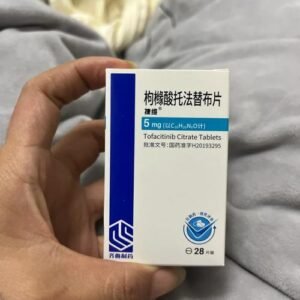Glycopyrronium Bromide
Function:
Glycopyrrolate can be used for gastric and duodenal ulcers and chronic gastritis; it can also be used for maintenance bronchiectasis treatment in adults with chronic obstructive pulmonary disease (COPD) (including chronic bronchitis and emphysema) to relieve symptoms. .
Dosage:
Different dosage forms of glycopyrronium bromide have different usage and dosage, so you must follow your doctor’s advice. The same medicines produced by different manufacturers may have inconsistent instructions. If you find any inconsistency in the instructions before taking the medicine, please consult your doctor or pharmacist in time. Glycopyrrolate tablets: Take orally, 1 to 2 mg once, 3 to 4 times a day, after meals and before going to bed; maintenance dose is 1 mg once, 2 times a day. Glycopyrronium bromide inhalation powder spray capsule: cannot be taken orally, only a specific inhaler can be used, and administered by oral inhalation. If swallowed by mistake, seek medical attention in time. The recommended dose is one capsule taken once daily, at the same time each day.
Adverse reactions:
Dry mouth (bitter mouth) may occur at the beginning of taking glycopyrrolate tablets, which will lessen or disappear after 1 to 2 weeks. The most common adverse reaction of glycopyrrolate inhalation powder spray capsule is dry mouth, which is mostly mild and mainly occurs in the first 4 weeks of treatment. Occasionally, urinary retention may occur, and gastrointestinal effects (including gastroenteritis and dyspepsia) may occur. Adverse reactions related to local tolerance include pharyngeal irritation, nasopharyngitis, rhinitis, and sinusitis, as detailed below. Infections and infestations: Nasopharyngitis is common, and rhinitis and cystitis are occasionally seen. Immune system diseases: Occasionally hypersensitivity reactions and angioedema. Metabolic and nutritional diseases: Hyperglycemia occasionally occurs. Mental and nervous system: Insomnia and headache are common, and hypoesthesia is rare. Heart disease: Atrial fibrillation and palpitations are occasionally seen. Respiratory, thoracic and mediastinal diseases: Sinus congestion, phlegmous cough, throat irritation, epistaxis, paradoxical bronchospasm, etc. are occasionally seen.
Drug contraindications:
If you are allergic to this product, use with caution during lactation. Use with caution during pregnancy.
Share:
Products
Our offers
Health Classification
Let us work together to protect precious health































